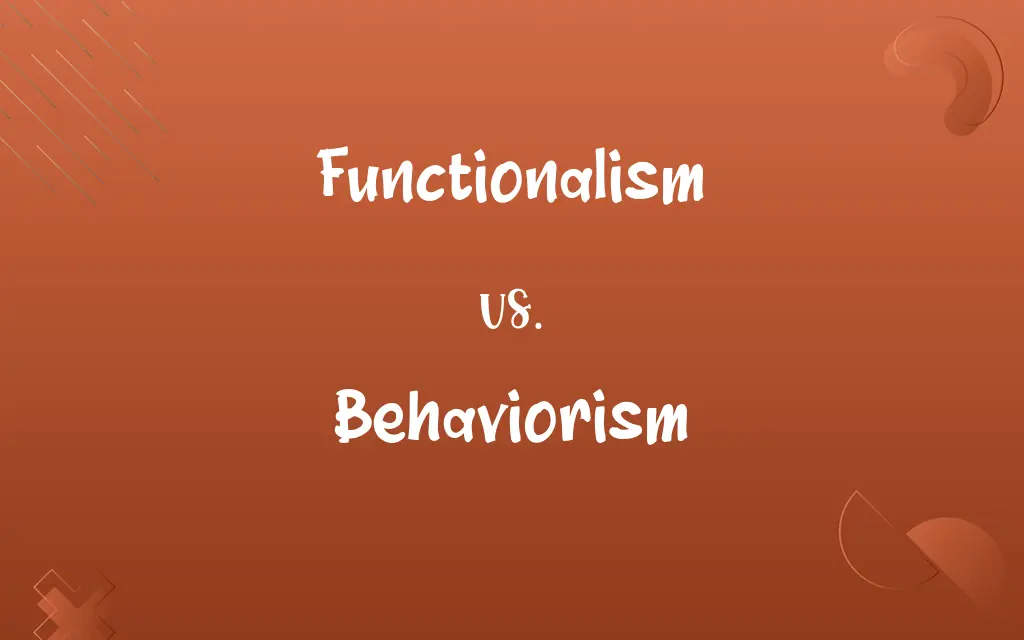Functionalism vs. Behaviorism: Know the Difference

By Shumaila Saeed || Updated on December 25, 2023
Functionalism studies mental states and processes, focusing on the purpose of consciousness, while Behaviorism emphasizes observable behavior, disregarding the study of mental states.

Key Differences
Functionalism, emerging in the late 19th century, examines mental processes and consciousness, exploring how and why the mind works as it does. Behaviorism, founded in the early 20th century, dismisses the relevance of mental states, focusing strictly on observable behavior.
Shumaila Saeed
Dec 11, 2023
Functionalists are interested in the role of mental processes in adapting to the environment. Behaviorists, however, view psychological research as only valid if it is based on observable and measurable behaviors, excluding introspective methods.
Shumaila Saeed
Dec 11, 2023
Functionalism considers the internal mental processes like thinking, memory, and the subjective nature of consciousness. In contrast, Behaviorism strictly adheres to external behaviors and rejects introspection as a method of psychological study.
Shumaila Saeed
Dec 11, 2023
Functionalism influenced the development of cognitive psychology, recognizing mental states' significance. Behaviorism led to the development of operant conditioning theories, emphasizing the influence of external stimuli on behavior.
Shumaila Saeed
Dec 11, 2023
Functionalism is associated with thinkers like William James and John Dewey, who emphasized the fluidity of consciousness. Behaviorism is associated with John B. Watson and B.F. Skinner, who focused on the predictability and control of behavior.
Shumaila Saeed
Dec 11, 2023
ADVERTISEMENT
Comparison Chart
Perspective on Mind
Interested in how and why the mind works
Disregards the study of the mind
Shumaila Saeed
Dec 11, 2023
Key Concepts
Consciousness, mental processes, adaptation
Conditioning, stimulus-response relationships
Shumaila Saeed
Dec 11, 2023
Research Methods
Introspection, considering subjective experiences
Experimental, focusing on measurable behaviors
Shumaila Saeed
Dec 11, 2023
ADVERTISEMENT
Functionalism and Behaviorism Definitions
Functionalism
Functionalism is a psychological philosophy focused on mental processes and their role in adapting to the environment.
Functionalism helped in understanding how children adapt their thinking as they grow.
Shumaila Saeed
Dec 04, 2023
Behaviorism
Behaviorism views behavior as a product of environmental stimuli.
Behaviorism explains phobias as learned responses to certain stimuli.
Shumaila Saeed
Dec 04, 2023
Functionalism
It views the mind as a fluid, dynamic process that interacts with the environment.
Functionalism explores how sensory input influences perception.
Shumaila Saeed
Dec 04, 2023
Behaviorism
Behaviorism is a theory of psychology that focuses on observable behaviors and disregards mental states.
Behaviorism studies the effects of reinforcement on learning.
Shumaila Saeed
Dec 04, 2023
Functionalism
Functionalism is a response to the earlier school of thought, structuralism.
Functionalism emerged as a critique of structuralism’s focus on the elements of consciousness.
Shumaila Saeed
Dec 04, 2023
ADVERTISEMENT
Behaviorism
It emphasizes conditioning and the stimulus-response relationship.
The use of positive reinforcement in dog training is a behaviorist approach.
Shumaila Saeed
Dec 04, 2023
Functionalism
It emphasizes the purpose and utility of consciousness and mental states.
Functionalism examines the role of emotions in decision-making processes.
Shumaila Saeed
Dec 04, 2023
Behaviorism
It employs experimental methods to study behavior in a controlled setting.
Behaviorists conduct experiments to understand how rewards influence behavior.
Shumaila Saeed
Dec 04, 2023
Functionalism
Functionalism investigates the internal workings of the mind and how they relate to behavior.
The study of memory recall techniques is an application of functionalism.
Shumaila Saeed
Dec 04, 2023
Behaviorism
Behaviorism dominated psychology in the mid-20th century.
The behaviorist approach was predominant in psychological research during the 1950s and 1960s.
Shumaila Saeed
Dec 04, 2023
Functionalism
The doctrine that the function of an object should determine its design and materials.
Shumaila Saeed
Dec 01, 2023
Behaviorism
A school of psychology that studies observable and quantifiable aspects of behavior and excludes the study of subjective phenomena, such as emotions or motives.
Shumaila Saeed
Dec 01, 2023
Behaviorism
An approach to psychology focusing on observable behavior which, generally assuming that behavior is determined by the environment and denying any independent significance for mind, largely ignores any pathophysiological processes which may, or may not, underlie subjective, behavioral phenomena.
''Behaviorism is considered by most philosophers of medicine, to be an expression of the weaker, minimalist interpretation of the 'medical model' of clinical psychology because it focuses the study and classification of mental disorders upon a phenomenological, rather than a pathophysiological, approach to the subject.
Shumaila Saeed
Dec 01, 2023
Functionalism
(Philosophy) The doctrine in the philosophy of mind according to which mental states are defined by their causes and effects.
Shumaila Saeed
Dec 01, 2023
Behaviorism
An approach to psychology that emphasizes observable measurable behavior.
Shumaila Saeed
Dec 01, 2023
Functionalism
(architecture) A doctrine, in several fields, that the function of something should be reflected in its design and the materials used in its construction.
Shumaila Saeed
Dec 01, 2023
Behaviorism
An approach to psychology that emphasizes observable measurable behavior
Shumaila Saeed
Dec 01, 2023
Functionalism
(philosophy) The definition of mental states in terms of their causes and effects.
Shumaila Saeed
Dec 01, 2023
Functionalism
(social science) The idea that social and cultural cohesion are a function of the interdependence and interactions of the institutions of a society.
Shumaila Saeed
Dec 01, 2023
Functionalism
(psychology) A general school of thought that considers psychological phenomena in terms of their role in adaptation to the person's environment.
Shumaila Saeed
Dec 01, 2023
Functionalism
A psychology based on the assumption that all mental process are useful to an organism in adapting to the environment.
Shumaila Saeed
Dec 01, 2023
Functionalism
A psychology based on the assumption that all mental process are useful to an organism in adapting to the environment
Shumaila Saeed
Dec 01, 2023
Repeatedly Asked Queries
What does functionalism study?
Functionalism studies mental processes, focusing on their role in adaptation and survival.
Shumaila Saeed
Dec 11, 2023
What is the main focus of behaviorism?
Behaviorism focuses on observable and measurable behavior, disregarding internal mental states.
Shumaila Saeed
Dec 11, 2023
What research methods are used in functionalism?
Functionalism uses introspection and considers subjective experiences.
Shumaila Saeed
Dec 11, 2023
How does functionalism view consciousness?
Functionalism views consciousness as a dynamic process that helps adapt to the environment.
Shumaila Saeed
Dec 11, 2023
Does behaviorism consider the importance of thoughts?
No, behaviorism does not consider thoughts, as they are not observable or measurable.
Shumaila Saeed
Dec 11, 2023
Who are prominent behaviorists?
Prominent behaviorists include John B. Watson and B.F. Skinner.
Shumaila Saeed
Dec 11, 2023
How does behaviorism study behavior?
Behaviorism studies behavior through experimental and observable methods.
Shumaila Saeed
Dec 11, 2023
Who are key figures in functionalism?
Key figures in functionalism include William James and John Dewey.
Shumaila Saeed
Dec 11, 2023
Can functionalism explain individual differences?
Yes, functionalism can explain individual differences through varying mental processes.
Shumaila Saeed
Dec 11, 2023
What influenced the development of functionalism?
Functionalism was influenced by evolutionary theory and the need to understand mental processes.
Shumaila Saeed
Dec 11, 2023
What led to the rise of behaviorism?
The rise of behaviorism was due to a focus on more scientific, observable aspects of psychology.
Shumaila Saeed
Dec 11, 2023
What impact did functionalism have on psychology?
Functionalism influenced the development of cognitive and educational psychology.
Shumaila Saeed
Dec 11, 2023
How do functionalism and behaviorism differ in studying emotions?
Functionalism studies emotions as part of mental processes, while behaviorism ignores them.
Shumaila Saeed
Dec 11, 2023
Does behaviorism account for emotions?
No, behaviorism does not account for emotions, as they are internal states.
Shumaila Saeed
Dec 11, 2023
Is behaviorism still influential today?
Yes, behaviorism's principles, especially in conditioning, are still influential in psychology.
Shumaila Saeed
Dec 11, 2023
How does behaviorism view learning?
Behaviorism views learning as a change in behavior due to environmental interactions.
Shumaila Saeed
Dec 11, 2023
How does functionalism view human behavior?
Functionalism views human behavior as influenced by mental processes and environmental interaction.
Shumaila Saeed
Dec 11, 2023
What is the stimulus-response theory in behaviorism?
The stimulus-response theory in behaviorism is that behavior is a response to environmental stimuli.
Shumaila Saeed
Dec 11, 2023
Does functionalism consider evolutionary aspects?
Yes, functionalism considers evolutionary aspects in understanding mental processes.
Shumaila Saeed
Dec 11, 2023
Can behaviorism explain complex human behavior?
Behaviorism has limitations in explaining complex human behavior, as it ignores internal mental states.
Shumaila Saeed
Dec 11, 2023
Share this page
Link for your blog / website
HTML
Link to share via messenger
About Author
Written by
Shumaila SaeedShumaila Saeed, an expert content creator with 6 years of experience, specializes in distilling complex topics into easily digestible comparisons, shining a light on the nuances that both inform and educate readers with clarity and accuracy.









































































